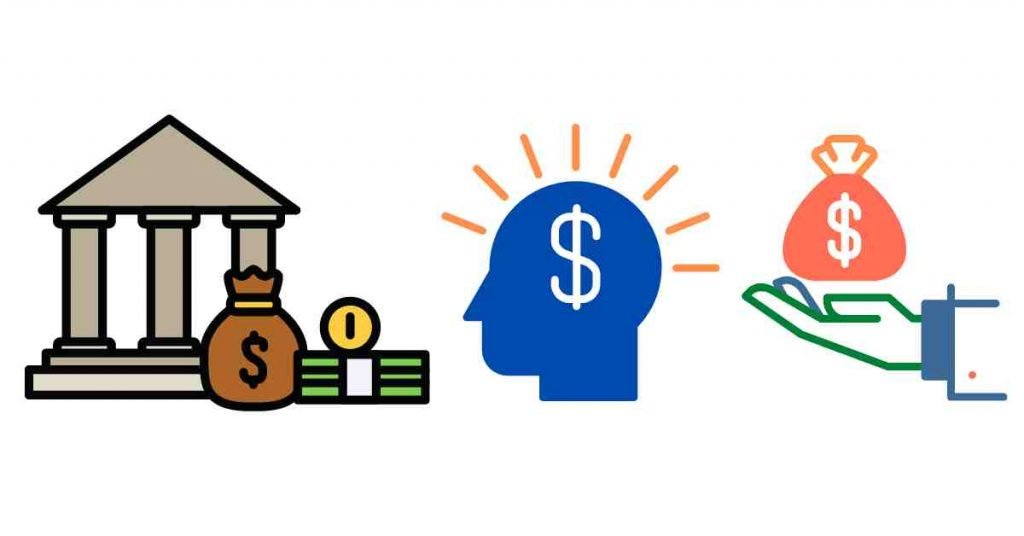Many ask “can I do my own financial planning?” or “what are the 6 steps or 4 steps of financial planning?” Yes, if you love your hard earned money and want to utilize it to the fullest, you must know what is meant by financial planning?
Here, I would like to mention that financial planning doesn’t mean only making or earning money for our livelihood. Its meaning is much boarder. And those who know that deeply, get rich in a very short time.
I hope that you already do some research on financial planning. But here in this blog post you find something special about financial planning.
I would like to say that those who are salaried individuals, should follow a certain financial plan. And those who are involved in self-employment as well as businessmen should not follow the plannings which a salaried individual follows.
But all of us should follow some common financial plans to maintain good financial health.
Table of Contents
These are 6 common steps for financial planning
- Financial goals
- Budgeting
- Saving
- Investing
- Security
- Emergency Funds
Still , some more steps and ideas are ahead that will help you to decide the above steps judiciously.
For sustainable investment download Finity app or INDmoney app
# Create 2 types of emergency funds
You need to maintain two types of emergency funds

Financial Planning Emergency Funds
- Health related
- At least 6 months’ of household expenses backup
This is what everyone should do after this Covid situation.
If the job leaves suddenly and the business closes, then there is a great problem.
So you should have a backup fund of at least 6 months for your monthly household expenses.
Peace of mind is great peace.
# Save money not only for just savings
Sometimes, we spend our life to save our money without having a clear goal in mind. We open a bank fixed deposit account or recurring deposit account just to get some extra but little interest rates. According to experts this is not always good practice at all.

It varies man to man, occupation to occupation.
We should remember that bank FDs or recurring deposits are for those who are between the age group of 45 to 60 or a woman.
For a young man those deposit plans are not preferable. Because in your young age you should take some more risk to multiply your money. If you learn to live on the interests of FDs in your 20s, you will have to stay in your comfort zone.
So, if you are saving a certain portion of your earnings, you should learn what you should do with that money.
Sometimes, we don’t have proper knowledge about investment plans but we can learn them.
Just mere savings can not be enough for asset creation or being rich. If you want to enjoy financial freedom, you must either multiply your income up to 10 folds or plan an accurate investment with your savings.
Where to invest your savings!
There are thousands of options open before you but all of them are not useful for everyone.
Let’s see the options: we discuss one by one in the later part of this article.
- Equity markets
- Debt markets
- Insurance plans
- Lands
- Golds
- Business
- lendings
- yourself
Do you know a simple fact? When we deposit our money to bank accounts, we get a simple interest rate. But, when we borrow some money as a loan from banks, we have to repay the loan at compound interest rates.
Here we should learn how the compounding rates of money benefits investors. So, try to put your savings not at simple interest rates but at compound rates.
A simple equation is here.
Divide your monthly income in
50 (savings) : 30 (daily basic needs) : 20 (emergency fund).
Now we assume Mr. A earns 30,000/month
His savings: 15,000/month
Daily basic needs: 9000/months
Emergency Fund: 6000/month
And Mr. A should invest at least 10% of his savings for the long term and 50% in mid and short terms (bank’s savings account).
# Create a budget that works for you-best financial planning
In the above para we see some basic points. Now we learn how you can make your budget more effectively .
We saw Mr.A now has 9000 rupees for his family’s daily needs. So his budget is 9000/month.
So here we learn whenever you divide your earnings in an equation, your budget will automatically create.
if the amount is not enough for your family you can add 10% more from your savings.
# Invest at least 10% in long term
Long term investment is the most important financial planning. We have already seen that many options are available to invest our savings. Now it is to discuss in detail.
Don’t invest your money when some agents visit your home and suggest some investment plan. Because they don’t come for a cup of tea, but they visit your home to do their business.
Before investing a portion of your savings, do some research.
If you are between 19 to 24, you can try Equity market investment.
Equity market investment: Share, stocks, trade, mutual funds. It is a little bit risky but the return is also very high in the long term.
It is said by many that Share market is a system to take money from impatient people and give it to those who keep patient. but don’t invest without having knowledge.
Debt markets: Government bonds, corporate bonds, mutual funds (passive index). Even without having knowledge here in these funds you can invest for a long term upto 5 to 10 years and get dividends, and profits.
I personally started investing for a long time in Equity market mutual funds .
Special Tips: Invest in NFOs. New Fund Offerings.
More useful discussions on more investment plans for the long term we will be discussing ahead.
# Create some passive income source

You can make your own financial planning and that works also when you generate some extra revenue even while you sleep.
Passive income means one kind of emergency fund. Sometimes, passive income saves us from inflation.
So, it is also an effective part of financial planning.
# Don’t buy anything that you can not buy 3 times
In our daily life, we should fulfill our desires, dreams too.

but here, apply some intelligence. Experts say that we should not purchase anything that we can not buy for 3 times. Because, we can not afford it in the long run.
Then should we not fulfill our dreams or desires?
Answer is simple ‘Yes’. But we should not invest a part of our capital here.
Again we should make an effective plan. We should create some passive income sources, as I mentioned previously.
Sometimes it is also seen that passive income gives us more profit than active income.
You can purchase a new car, mobile phones, motor bikes, etc very easily. otherwise , you may like to take a loan but loans means only and only liabilities here in such cases.
You should know why you should take a loan. When is a loan considered good?
So, considering all these points, You are advised not to fulfill your dreams or desires by spending even a very little portion of your capital or savings.
# Don’t purchase only insurance plans-better financial planning
I remember when I heard this line for the first time it felt awkward. I think you also get shocked hearing this line now.
But wait, I have something new on this matter.
It turns out that life insurance plans alone do not provide good returns even after many years
Rather, the same monthly premium can be deposited in equity funds or mutual funds to get much higher returns.
But this is no guarantee of capital in equity funds.
That is why we need a combination of an investment plan and insurance plan. This is the ‘Capital Guarantee Plan’. Under this plan though 60% of your investment goes into debt markets and the rest are to equity markets, you enjoy full guarantee of capital return.
So, if you are not ready to take risk in the share markets, you can invest your money in such funds.
# Don’t invest your money in flats
When I was thinking of my new house, I was confused about whether I should buy a land or a flat.
I gave it a deep thought. I considered appreciation and depreciation.
Later, I Purchased a land and built my own house.
Why should I not purchase a flat?
Increasing population creates increasing demand for land.
So, The land that is worth 10 lakh rupees today was worth 1 lakh rupees 10 years ago.
There is no depreciation in land but once you enter a flat, it will be a second hand product like an old car.
You can not sell your flat for more than you purchased it.
Also, natural disasters like earthquakes can ruin investments like flats but if you have your own land you can easily make up for that loss.
So, if you plan your house, think 10 times before investing in flats.
Invest your money in lands because it is an asset creation.
# Understand what you are investing in-financial planning
Influenced by someone, don’t invest even a little money in any plan.
Before investing please know and understand in detail, what profit you will gain in how much time, risk factors, nominee, taxation, etc.
Otherwise , results may not satisfy you.
# Take loans for financial planning
You might ask yourself “should I take a loan?”
You will get the answer here. Remember loan is one type of liabilities. I would like to advise not to take loans.
but loans have advantages too. Previously we discussed why to invest in lands instead of flats or builder floors.
So, if you want to purchase land in a good locality, go for loans. It will help you to create assets or double your invested money. In one of the other articles, I discussed the top benefits of loans.
Some types of loans you can prefer:
- Educational Loans
- Business Loans
- Home Loans
- Commercial Vehicle Loans
Some types of loans you must avoid:
- Personal Loans
- Car Loans
- Marriage Loans
- Two Wheelers Loans
- Loans to purchase luxury goods
# Don’t ignore using credit card
It happens now and then that many of us think of healthy financial planning but at the same time we ignore using credit cards. Do we ever analyse the real benefits of credit cards?
Let’s see why we should use credit cards one by one.
- 50 days interest from savings account
- Improve your CIBIL score
- Income tax benefits on business expenses
- Earn reward points on credit cards
- Earn attractive cashbacks
- Enjoy no cost EMI option
- Track all your expenses on statements
So, if you want to make your own financial planning strong, don’t ignore using credit cards.
Final Words-Credit Cards-Financial Planning
- Earning reward points on credit cards
- Earn attractive cashbacks
- Enjoy no cost EMI option
- Track all your expenses on statements
So, if you want to make your own financial planning strong, don’t ignore using credit cards.
# Pay for yourself first-one of the best financial planning points
That would be a big mistake if we don’t plan any expenses for ourselves. I’m not talking about luxury here, I’m talking about self-development.
Let’s take an example,
Suppose I do a job and get a salary of Rs 10,000 per month.
Now if I want to start an online business for passive income then I have to buy a good computer or laptop.
If I don’t spend time here, it can’t be called economic planning.
So we need to invest in things that will make us more economically empowered are:
- Books
- Technology
- Entertainment
- Formal Dress
- Healthy Foods
- Safe drinking water
- Hygienic living place
Only if we can maintain ourselves in a healthy body and mind, our financial planning will be successful and we will be able to enjoy financial freedom in the future.
Final Words-Financial Planning
Economic planning is not a matter of any other planet or it requires any special qualifications.
We need to understand from what is happening around us how we need to be prepared for the days to come.
We need to maintain two emergency funds
- Health
- Daily basic household expenses
We need to invest 10 percent of our earnings in the long term.
You shouldn’t save just for savings. We should save to invest and to create assets. Pay a premium for such a plan where both insurance and investment are available.
Learn what are the benefits of taking loans, credit cards. At last we should be thankful to ourselves for what we have. Self-improvement is the real economic plan.
Are you interested in create wealth by investing in ‘Stock market’, ‘IPOs’, ‘Mutual Funds’, etc. These Posts will help you a lot if you would like to learn investing. Just Check out them
- How to start investing on the stock market/share market learn 15 important points for beginners
- How to start investing in SIP in mutual funds learn top 10 important points for beginners.
- Why should you have free demat account learn best 10 usefulness of free demat account

I am a personal finance, stock market update, etc.-related blog post writer. Besides, I am a stock market trader. I invest in IPOs, stocks, Etc. I publish valuable posts and information here.
Sir the ideas you have shared are masterpiece……I loved the point
..”don’t buy anything you can’t buy 3 times” . If a person follows this strategy from from his /her early 20’s he/she won’t face much financial problems .
Loved your writing ,simple and easy to understand ??